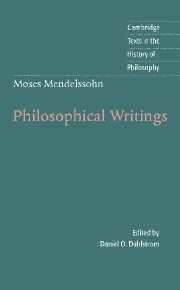Book contents
- Frontmatter
- Contents
- Acknowledgments
- Introduction
- Chronology
- Further reading
- Note on texts and translation
- Philosophical writings
- Preface
- Part I
- Part II
- On evidence in metaphysical sciences
- On the ability to know, the ability to feel, and the ability to desire
- On the question: what does “to enlighten” mean?
- Index
- Cambridge texts in the history of philosophy
Introduction
Published online by Cambridge University Press: 05 June 2012
- Frontmatter
- Contents
- Acknowledgments
- Introduction
- Chronology
- Further reading
- Note on texts and translation
- Philosophical writings
- Preface
- Part I
- Part II
- On evidence in metaphysical sciences
- On the ability to know, the ability to feel, and the ability to desire
- On the question: what does “to enlighten” mean?
- Index
- Cambridge texts in the history of philosophy
Summary
Moses Mendelssohn, one of the most gifted and intriguing figures of the German Enlightenment, first published his Philosophical Writings in 1761, and in a revised edition in 1771. Only one essay (“Rhapsody”) was newly written; the others, dating back to 1754, had already established his reputation as a thoughtful and effective writer on a variety of issues of pressing concern to his contemporaries. In the Philosophical Writings the reader will find: an explanation of the various sorts and sources of pleasure, a nuanced defense of Leibniz's theodicy and conception of freedom, an examination of the ethics of suicide, an account of the “mixed sentiments” so central to the tragic genre, a hypothesis about weakness of will, an elaboration of the main principles and types of art, a definition of sublimity and analysis of its basic forms, and, lastly, a brief tract on probability theory, aimed at rebutting Hume's skepticism.
Despite its rich range of themes, Mendelssohn's collection of six youthful essays does not lack for unity. Their common purpose is to demonstrate the continuing viability of a metaphysical framework shaped by Leibniz and Christian Wolff, especially for a topic – the nature and variety of sentiments – often neglected by that metaphysical tradition and treated with greater sensitivity by English and French authors. “Sentiment” stands here for an emotionally and hedonically charged human knowledge or awareness by way of the senses, one that can be “perfect or complete” when its object is something beautiful.
- Type
- Chapter
- Information
- Moses Mendelssohn: Philosophical Writings , pp. ix - xxxPublisher: Cambridge University PressPrint publication year: 1997

